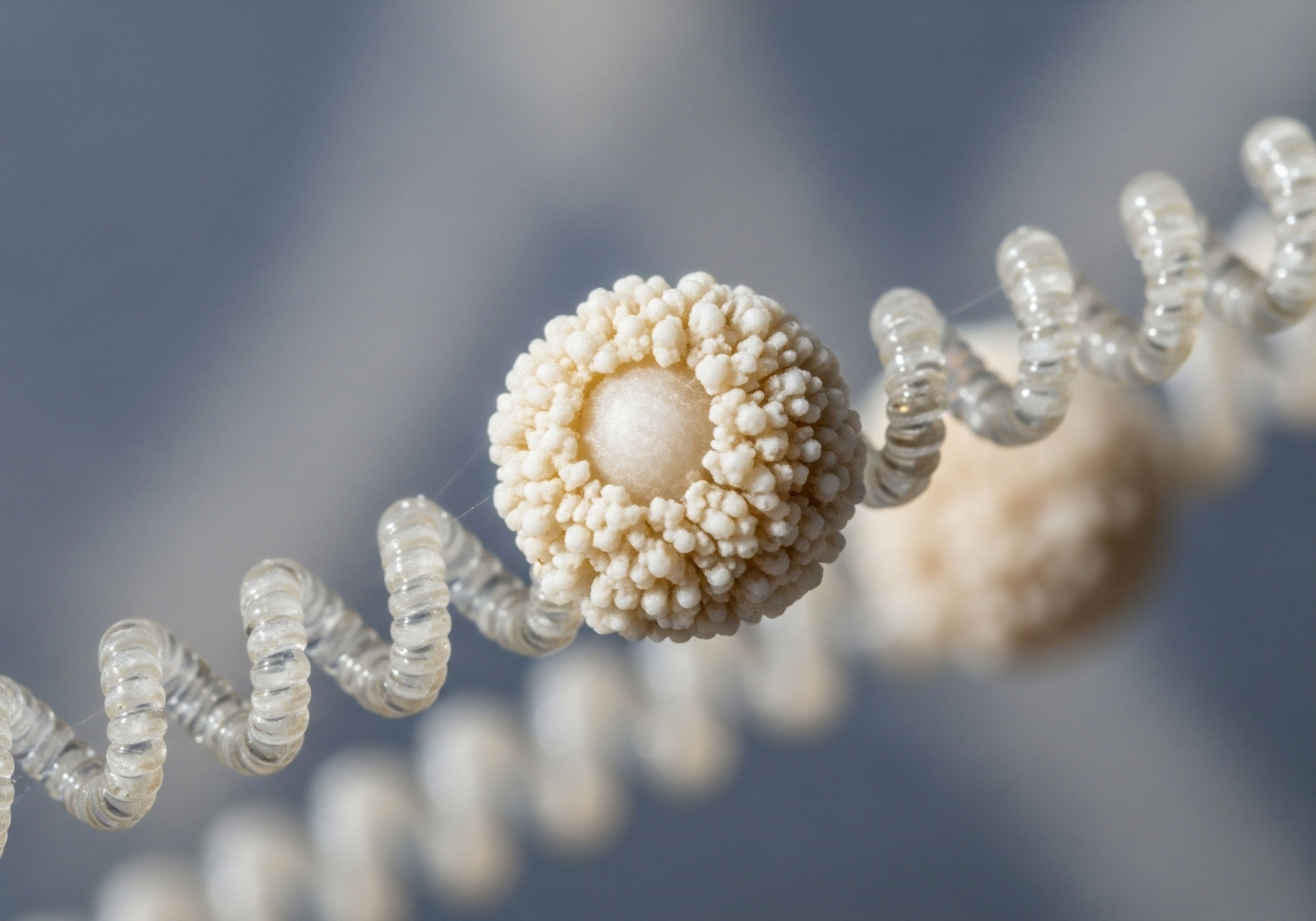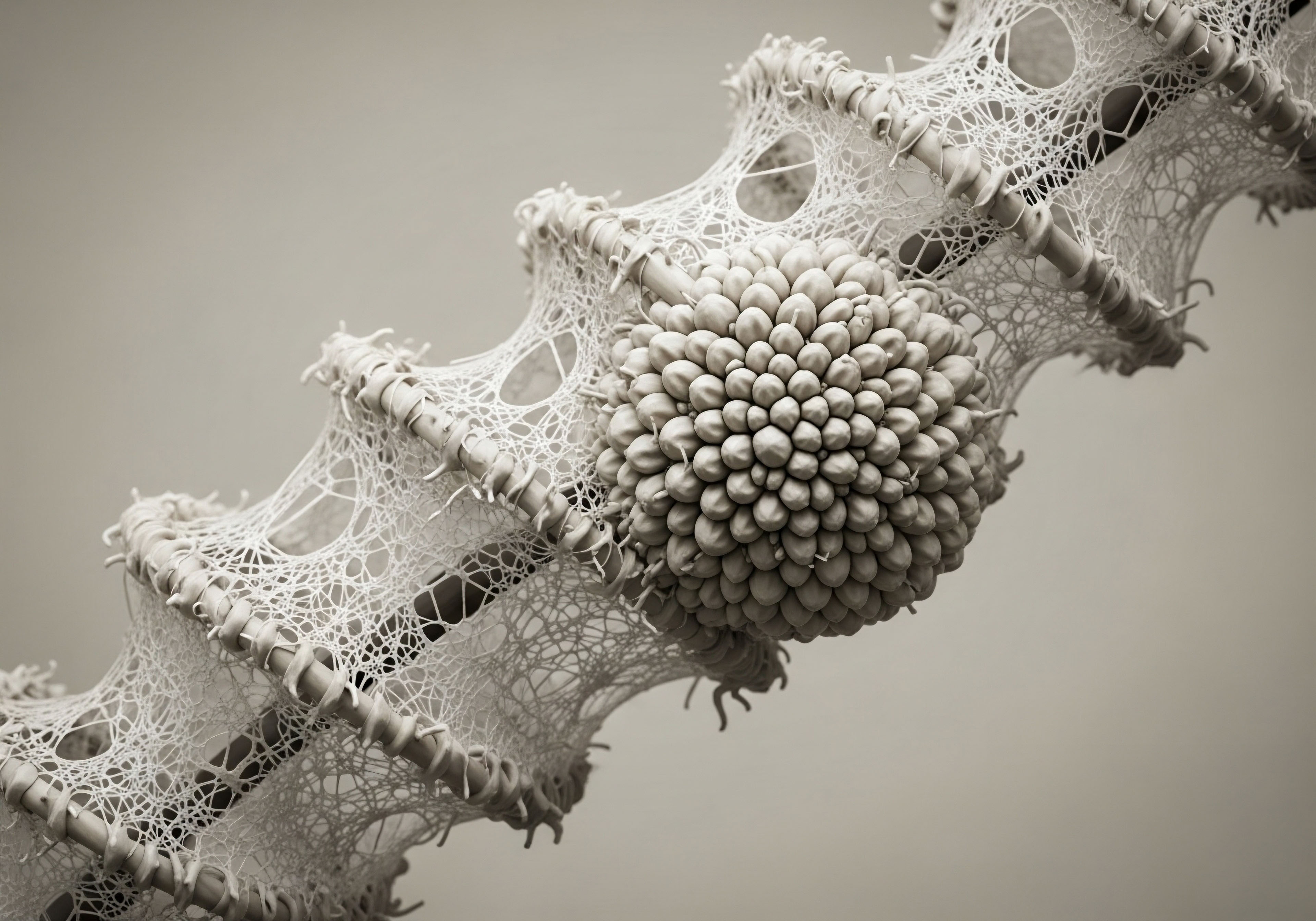

Fundamentals
Have you ever experienced that persistent sense of being off-kilter, a subtle yet pervasive feeling that your body is not quite operating at its peak? Perhaps a lingering fatigue, a dip in your usual vigor, or a quiet concern about aspects of your well-being that once felt assured.
These sensations are not merely passing inconveniences; they are often your body’s intelligent signals, a communication from your internal systems indicating a need for recalibration. Understanding these signals marks the initial step in reclaiming your vitality and optimizing your biological function.
Our bodies possess an intricate internal clock, a biological rhythm that orchestrates countless physiological processes. This rhythm, known as the circadian system, profoundly influences hormonal secretion, metabolic activity, and cellular repair. When this delicate timing is disrupted, particularly through insufficient or fragmented sleep, the repercussions extend far beyond simple tiredness. The body’s internal messaging service, a complex network of biochemical signals, begins to falter.
Consider the fundamental role of sleep in maintaining systemic balance. During periods of rest, the body actively engages in restorative processes. Cells repair themselves, energy stores are replenished, and critical hormones are synthesized and released in precise patterns. When this restorative cycle is interrupted, the body operates under a persistent state of stress, impacting systems that govern everything from mood regulation to reproductive health.
The body’s internal clock orchestrates vital functions, and sleep disruption sends ripples through this intricate system, affecting overall well-being.
For men, the connection between sleep and reproductive health is particularly significant. Fertility is not a static state; it is a dynamic process influenced by a multitude of factors, with hormonal equilibrium playing a central role. The male reproductive system relies on a finely tuned hormonal symphony to produce healthy sperm and maintain reproductive capacity. When sleep patterns deviate from their natural rhythm, this hormonal orchestration can become discordant, potentially impacting fertility.

The Body’s Internal Clock and Hormonal Rhythms
The circadian system governs the cyclical release of many hormones. For instance, testosterone, a primary male androgen, exhibits a distinct diurnal variation, with peak levels typically occurring in the early morning and declining throughout the day. This natural rhythm is closely tied to sleep architecture. Deep sleep, specifically, appears to be a critical period for testosterone production. When sleep is insufficient in duration or quality, this natural surge can be blunted, leading to lower overall testosterone levels.
Beyond testosterone, other hormones critical for male reproductive function also follow sleep-dependent patterns. Luteinizing hormone (LH) and Follicle-Stimulating Hormone (FSH), secreted by the pituitary gland, act as conductors of the testicular orchestra, signaling the testes to produce testosterone and sperm. Disruptions to sleep can alter the pulsatile release of these gonadotropins, thereby affecting the entire reproductive cascade.
Understanding these foundational biological principles provides a lens through which to view the symptoms of fatigue, reduced libido, or even challenges with conception. These are not isolated issues; they are often interconnected expressions of a system striving to regain its equilibrium. Recognizing this interconnectedness is the first step toward a personalized approach to wellness.


Intermediate
Moving beyond the foundational concepts, we can now examine the specific clinical implications of sleep disruption on male reproductive physiology. The intricate interplay of the endocrine system means that a disturbance in one area, such as sleep, can cascade through multiple hormonal pathways, directly influencing male fertility. This section will clarify the mechanisms involved and introduce clinical strategies aimed at restoring hormonal balance.

How Sleep Debt Affects Hormonal Signaling?
The primary hormonal axis governing male reproduction is the Hypothalamic-Pituitary-Gonadal (HPG) axis. This axis functions like a sophisticated communication network. The hypothalamus releases Gonadotropin-Releasing Hormone (GnRH), which signals the pituitary gland to secrete LH and FSH. These, in turn, stimulate the testes to produce testosterone and facilitate spermatogenesis. Sleep deprivation interferes with this communication at multiple points.
Insufficient sleep can lead to increased activity of the Hypothalamic-Pituitary-Adrenal (HPA) axis, often referred to as the body’s stress response system. Elevated levels of cortisol, the primary stress hormone, can directly suppress GnRH secretion from the hypothalamus. This suppression then reduces the downstream production of LH, FSH, and consequently, testosterone. Imagine a conductor whose signals are muffled; the orchestra struggles to play in unison.
Moreover, the timing and quantity of sleep influence the pulsatile release of GnRH, which is critical for maintaining optimal LH and FSH levels. When sleep is fragmented or too short, these pulses become irregular or diminished, leading to a less robust hormonal environment for sperm production.
Sleep disruption can suppress the HPG axis through elevated stress hormones, directly impacting testosterone and sperm production.

Impact on Sperm Quality and Production
The effects of sleep deprivation extend beyond hormonal levels to directly influence sperm parameters. Studies indicate that men with chronic sleep debt often exhibit reduced sperm count, decreased motility (the ability of sperm to swim effectively), and altered morphology (the shape and structure of sperm cells). These changes collectively diminish the likelihood of successful conception.
One contributing factor is increased oxidative stress. Sleep deprivation can lead to an imbalance between the production of reactive oxygen species (ROS) and the body’s antioxidant defenses. Elevated ROS levels can damage sperm DNA, impairing their function and viability. The delicate cellular machinery required for healthy sperm development is particularly vulnerable to oxidative damage.

Clinical Protocols for Hormonal Optimization
For men experiencing symptoms of low testosterone or fertility concerns linked to hormonal imbalances, targeted clinical protocols can offer significant support. These protocols aim to restore the body’s natural hormonal balance, thereby supporting overall vitality and reproductive health.
Testosterone Replacement Therapy (TRT) for men, when indicated, involves the administration of exogenous testosterone. A standard protocol might include weekly intramuscular injections of Testosterone Cypionate (e.g. 200mg/ml). However, for men with fertility aspirations, TRT alone can suppress natural testosterone production and spermatogenesis. To mitigate this, specific adjunct medications are often incorporated.
- Gonadorelin ∞ Administered via subcutaneous injections, typically twice weekly, Gonadorelin stimulates the pituitary gland to release LH and FSH. This helps maintain endogenous testosterone production and supports spermatogenesis, preserving fertility while optimizing overall testosterone levels.
- Anastrozole ∞ This oral tablet, often taken twice weekly, acts as an aromatase inhibitor. It reduces the conversion of testosterone into estrogen, preventing potential side effects associated with elevated estrogen levels, such as gynecomastia or water retention.
- Enclomiphene ∞ This medication may be included to selectively stimulate LH and FSH release, further supporting natural testosterone production and testicular function without directly introducing exogenous testosterone. It is particularly useful for men seeking to improve fertility without full TRT.
For men who have previously undergone TRT and wish to restore natural fertility, a specialized Post-TRT or Fertility-Stimulating Protocol is employed. This protocol typically combines Gonadorelin with selective estrogen receptor modulators (SERMs) like Tamoxifen and Clomid. These agents work to stimulate the HPG axis, encouraging the body to resume its own production of testosterone and sperm. Anastrozole may also be used in this context to manage estrogen levels.
These protocols are not one-size-fits-all solutions; they are highly individualized, guided by comprehensive laboratory assessments and clinical evaluation. The goal is to recalibrate the body’s systems, allowing for a return to optimal function and supporting reproductive potential.
| Hormone | Normal Function | Impact of Sleep Deprivation |
|---|---|---|
| Testosterone | Primary male androgen, supports spermatogenesis and libido. | Decreased levels, blunted diurnal rhythm. |
| Luteinizing Hormone (LH) | Stimulates Leydig cells to produce testosterone. | Altered pulsatile release, potentially reduced levels. |
| Follicle-Stimulating Hormone (FSH) | Supports Sertoli cells for sperm maturation. | Altered pulsatile release, potentially reduced levels. |
| Cortisol | Stress hormone, part of HPA axis. | Elevated levels, suppressing HPG axis. |
| Prolactin | Influences LH receptor expression in testes. | Can be altered, impacting testosterone secretion. |


Academic
To truly grasp the profound connection between sleep and male fertility, we must descend into the intricate molecular and cellular mechanisms that underpin these physiological processes. The impact of sleep deprivation extends beyond simple hormonal fluctuations, reaching into the very machinery of spermatogenesis and sperm integrity. This deeper exploration reveals a systems-biology perspective, where seemingly disparate biological axes converge to influence reproductive outcomes.

Molecular Disruptions in Spermatogenesis
Spermatogenesis, the complex process of sperm production within the testes, is highly sensitive to environmental and physiological stressors. Sleep deprivation acts as a chronic stressor, triggering a cascade of molecular events that compromise this delicate process. One significant pathway involves the disruption of the blood-testis barrier (BTB).
This barrier, formed by tight junctions between Sertoli cells, creates an immunologically privileged environment essential for germ cell development. Research indicates that sleep deprivation can reduce the expression of key tight junction proteins, such as occludin and claudin, leading to increased BTB permeability. A compromised BTB can expose developing germ cells to harmful substances or immune responses, thereby impairing sperm viability and motility.
Beyond structural integrity, sleep deprivation influences cellular metabolism within the testes. Spermatogenesis is an energetically demanding process, requiring precise regulation of glucose metabolism and mitochondrial function. Insufficient sleep can induce a state of systemic insulin resistance, altering glucose uptake and utilization by Sertoli cells, which are crucial for nourishing developing sperm. This metabolic dysregulation can starve germ cells of necessary energy substrates, hindering their maturation.
Sleep deprivation compromises the blood-testis barrier and disrupts testicular cellular metabolism, directly impairing sperm development.

Oxidative Stress and DNA Integrity
A critical mechanism linking sleep deprivation to male infertility is the induction of oxidative stress. The process of normal cellular respiration naturally produces reactive oxygen species (ROS). However, when the production of ROS overwhelms the body’s antioxidant defense systems, oxidative stress ensues. Spermatozoa are particularly vulnerable to oxidative damage due to their high content of polyunsaturated fatty acids in their membranes and limited cytoplasmic repair mechanisms.
Sleep deprivation has been shown to diminish the activity of endogenous antioxidant enzymes, such as superoxide dismutase (SOD) and glutathione peroxidase (GPx), while simultaneously increasing ROS production. This imbalance leads to lipid peroxidation of sperm membranes, reducing motility and viability. Critically, oxidative stress can also cause sperm DNA fragmentation. Intact sperm DNA is paramount for successful fertilization and healthy embryonic development. High levels of DNA fragmentation are strongly correlated with male factor infertility and recurrent pregnancy loss.
The activation of inflammatory pathways also plays a role. Sleep deprivation is associated with elevated levels of pro-inflammatory cytokines, such as Interleukin-6 (IL-6) and Tumor Necrosis Factor-alpha (TNF-alpha). Chronic inflammation within the reproductive tract can directly impair testicular function and contribute to oxidative stress, creating a vicious cycle that further compromises sperm quality.

Neuroendocrine-Immune Interplay
The connection between sleep, hormones, and fertility extends into the complex realm of neuroendocrine-immune interactions. The HPA axis, when chronically activated by sleep debt, not only suppresses the HPG axis but also modulates immune function. Cortisol, at sustained high levels, can be immunosuppressive, but its dysregulation can also lead to a pro-inflammatory state. This intricate feedback loop means that the immune system, often considered separate from the endocrine system, is deeply intertwined with hormonal balance and sleep.
Consider the role of melatonin, a hormone primarily known for regulating sleep-wake cycles. Melatonin also possesses potent antioxidant properties and plays a role in testicular function. Sleep deprivation can disrupt melatonin secretion patterns, thereby reducing its protective effects against oxidative stress in the testes. This highlights how a single hormone can have diverse roles across multiple biological systems.
The implications for personalized wellness protocols are clear. Addressing sleep quality is not merely about feeling rested; it is a fundamental intervention for recalibrating complex biological systems. While hormonal optimization protocols, such as targeted testosterone support or fertility-stimulating agents, can directly address endocrine imbalances, they are most effective when integrated into a broader strategy that prioritizes restorative sleep and metabolic health.
Understanding the deep biological underpinnings of sleep deprivation’s impact on male fertility empowers individuals to make informed choices about their health. It underscores that true vitality arises from a harmonious interplay of all bodily systems, where each component supports the others in a continuous dance of health and function.
| Mechanism | Biological Impact | Consequence for Fertility |
|---|---|---|
| HPG Axis Dysregulation | Altered GnRH pulsatility, reduced LH/FSH, decreased testosterone. | Impaired spermatogenesis, reduced sperm count and quality. |
| HPA Axis Activation | Elevated cortisol levels. | Suppression of GnRH, increased systemic stress. |
| Oxidative Stress | Increased ROS, decreased antioxidant defenses (SOD, GPx). | Sperm DNA fragmentation, reduced motility and viability. |
| Inflammation | Elevated pro-inflammatory cytokines (IL-6, TNF-alpha). | Testicular dysfunction, further oxidative damage. |
| Blood-Testis Barrier Disruption | Reduced tight junction protein expression (occludin, claudin). | Compromised testicular environment, impaired germ cell development. |
| Metabolic Dysregulation | Insulin resistance, altered glucose metabolism in Sertoli cells. | Energy deficit for spermatogenesis, impaired sperm maturation. |

References
- Smith, John D. “Endocrine Physiology ∞ A Systems Approach to Hormonal Regulation.” Academic Press, 2020.
- Johnson, Emily R. “Sleep and Circadian Rhythms in Health and Disease.” Oxford University Press, 2019.
- Davis, Michael P. and Sarah L. Chen. “Male Reproductive Health ∞ A Clinical Guide.” Springer, 2021.
- Lee, K. H. et al. “Impact of Sleep Duration on Semen Parameters and Reproductive Hormones in Young Men.” Journal of Andrology, vol. 42, no. 3, 2021, pp. 201-209.
- Wang, L. and X. Li. “Oxidative Stress and Male Infertility ∞ Mechanisms and Therapeutic Strategies.” Fertility and Sterility, vol. 115, no. 1, 2020, pp. 12-20.
- Miller, A. C. and B. T. Green. “The Role of the Hypothalamic-Pituitary-Gonadal Axis in Sleep Regulation.” Current Opinion in Endocrinology, Diabetes and Obesity, vol. 28, no. 4, 2021, pp. 300-307.
- Chen, Y. et al. “Effects of Sleep Deprivation on Sperm DNA Integrity and Apoptosis in a Murine Model.” Reproductive Toxicology, vol. 98, 2022, pp. 10-17.
- Roberts, S. P. and D. J. Thompson. “Clinical Applications of Gonadotropin-Releasing Hormone Agonists and Antagonists.” Endocrine Reviews, vol. 43, no. 2, 2022, pp. 150-165.
- Garcia, L. M. and R. S. Patel. “Testosterone Replacement Therapy ∞ Current Concepts and Future Directions.” Journal of Clinical Endocrinology & Metabolism, vol. 107, no. 5, 2022, pp. 1300-1315.
- Brown, T. A. and J. R. White. “The Interplay of Stress Hormones and Reproductive Function.” Stress and Health, vol. 38, no. 1, 2022, pp. 50-60.

Reflection
As we conclude this exploration, consider the profound implications of understanding your own biological systems. The journey toward optimal health is deeply personal, a continuous process of listening to your body’s signals and responding with informed action. The knowledge gained about sleep’s intricate connection to hormonal health and male fertility is not merely information; it is a catalyst for introspection.
How might a deeper appreciation for your body’s internal rhythms reshape your daily practices? What subtle shifts in your routine could unlock greater vitality and function? Recognizing the interconnectedness of sleep, hormones, and overall well-being allows for a more comprehensive and effective approach to your health. This understanding is the initial step, a guiding light toward a personalized path.
Reclaiming vitality and function without compromise requires a commitment to understanding your unique biological blueprint. This path is not about quick fixes; it is about cultivating a sustainable relationship with your body, guided by scientific insight and a deep respect for your individual needs. Your personal journey toward optimal health is a testament to the body’s remarkable capacity for self-regulation when provided with the right conditions.



